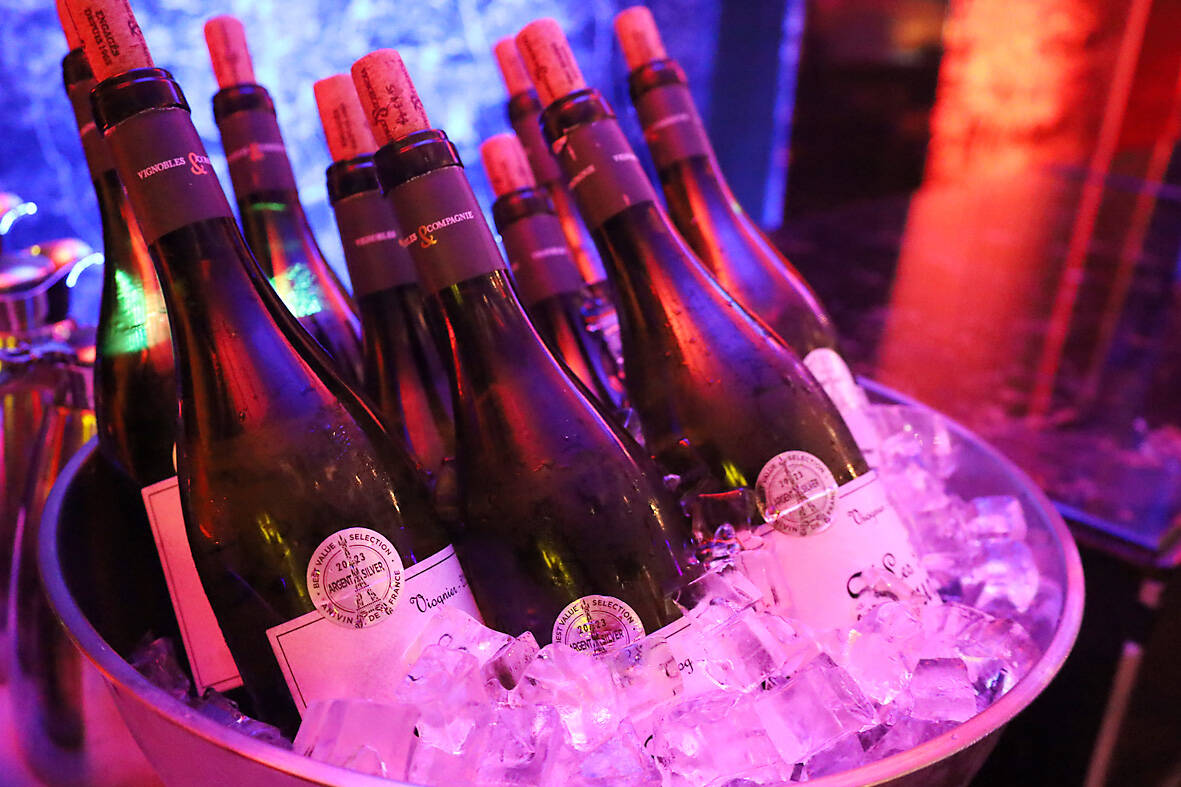On Friday last week, around 450 guests converged on the third floor ballroom of Grand Hyatt Taipei in Xinyi District (信義) to sample the very best in Franco-hospitality.
The annual gala dinner, hosted by the French Chamber Taiwan (法國工商會) came at the end of an inauspicious month that has witnessed some wild weather, heated political protests and heightened cross-strait tensions. Business leaders and industry folk were doubtlessly looking for an occasion to cool off. Thankfully, event-organizers didn’t disappoint.
ELEGANCE IN MOTION

Photo: Thomas Bird, Taipei Times
This year’s theme was Elegance in Motion, which, according to the organizers, reflected Paris’ role as host city of this summer’s Olympic games. Stuffed mascots, the Olympic Phryge — based on the traditional small Phrygian hats — were laid out on the red carpet to greet guests.
After obligatory photo ops, food and drink soon took center stage — Royal Caviar was nibbled; French wines, Perrier-Jouet Champagne and specially crafted cocktails by Pernod Ricard were sipped, as business cards exchanged hands like chips on a poker table.
As one would expect of any French affair, fashionwear was also under the spotlight. Attendees were invited to wear “red, white and blue” — the tricolor of the French flag — “with a touch of gold” for “elegance” while the lofty models in attendance were sporting neoteric garments courtesy of award-winning designer Gioia Pan (潘怡良),the Queen of Knitwear, and Taiwan Jewelry Designers’ Association Chairman Lu Zheng-nan (呂政男).

Photo: Thomas Bird, Taipei Times
A speech by Director of the Bureau Francais de Taipei (BFT) Franck Paris welcomed guests to the gala just as the first course was served at front-of-stage VIP roundtables, where a number of political and industry figures were seated.
Yet notwithstanding the gala’s haute couture and specialites culinaires the evening proved to be uplifting and, indeed, light-hearted — carefully choreographed so as not to force feed guests with too heavy a dose of “brand France.”
“That’s how it’s been since we first produced this event five years ago,” Mathias Daccord of event company One Milometer (一毫米) says of the gala’s philosophy. “We work with Stephane Peden to keep it fun, he’s aware that corporate events can get boring.”
Peden has been the General Manager of the French Chamber for six years and sees his role as multifaceted, “something like a community manager, bringing people together to create something meaningful for our members and for society in general.”
One of the evening highlights was a tongue-in-cheek performance courtesy of Peden himself, who paid tribute to the breakdancing competition that will be premiered at the Olympic Games Paris 2024. Dressed in classic hip-hop attire, including a Chinese Taipei sports jacket, Peden made his way to stage to the accompaniment of a French rap song, before dropping the mic and showing off his breakdancing skills. He then threatened to battle anyone in the audience, only to be confronted by Taiwanese taekwondo blackbelt Lo Chia-ling (羅嘉翎). The 22-year-old Olympic-hopeful promptly exhibited her high-kick just a few inches from Peden’s nose.
FRANCO-TAIWANESE COOPERATION
The jovial character of the gala dinner was underscored by more serious intentions vis-a-vis French business in Taiwan.
Talking backstage with the Taipei Times, Peden said, “Of course, France is country of luxury brands, joie de vie and food and beverage, but we are also a country of innovation and industry.”
He noted that many French enterprises were keen to work with their Taiwanese counterparts on everything from decarbonization to AI and that the French Chamber Taipei had established an event called Rendezvous “to organize panel discussions between ministers and French companies.”
When asked whether French entrepreneurs were ever reluctant to do business in Taiwan due to geopolitical concerns, Peden — who has been resident in Taiwan for 13 years and is a shareholder in popular nightspot Opera Taipei — believes the media is to blame for fanning the flames.
“The problem [for] Taiwan is it is not known as well as it should be, as, for a long time it was forgotten when everybody was focusing on [doing business in] China. Now, after COVID, people understand that Taiwan is a democracy and a place where you can find a lot of high-end electronics like semiconductors. But the media in Europe gives a wrong image about what’s happening here by reporting on what China does, which sows fear. When you live in Taiwan you really see it differently from how you see it on the TV in France.”
Peden’s upbeat sentiment is seemingly channeled by the high-energy showband ADOGA (阿逗仔) who take to the stage after the lucky draw to close the evening with an eclectic set of pop and rock classics. Digestifs are served at the bar, and the crowd hits the dancefloor.

Jacques Poissant’s suffering stopped the day he asked his daughter if it would be “cowardly to ask to be helped to die.” The retired Canadian insurance adviser was 93, and “was wasting away” after a long battle with prostate cancer. “He no longer had any zest for life,” Josee Poissant said. Last year her mother made the same choice at 96 when she realized she would not be getting out of hospital. She died surrounded by her children and their partners listening to the music she loved. “She was at peace. She sang until she went to sleep.” Josee Poissant remembers it as a beautiful

Before the last section of the round-the-island railway was electrified, one old blue train still chugged back and forth between Pingtung County’s Fangliao (枋寮) and Taitung (台東) stations once a day. It was so slow, was so hot (it had no air conditioning) and covered such a short distance, that the low fare still failed to attract many riders. This relic of the past was finally retired when the South Link Line was fully electrified on Dec. 23, 2020. A wave of nostalgia surrounded the termination of the Ordinary Train service, as these train carriages had been in use for decades

Lori Sepich smoked for years and sometimes skipped taking her blood pressure medicine. But she never thought she’d have a heart attack. The possibility “just wasn’t registering with me,” said the 64-year-old from Memphis, Tennessee, who suffered two of them 13 years apart. She’s far from alone. More than 60 million women in the US live with cardiovascular disease, which includes heart disease as well as stroke, heart failure and atrial fibrillation. And despite the myth that heart attacks mostly strike men, women are vulnerable too. Overall in the US, 1 in 5 women dies of cardiovascular disease each year, 37,000 of them

Politically charged thriller One Battle After Another won six prizes, including best picture, at the British Academy Film Awards on Sunday, building momentum ahead of Hollywood’s Academy Awards next month. Blues-steeped vampire epic Sinners and gothic horror story Frankenstein won three awards each, while Shakespearean family tragedy Hamnet won two including best British film. One Battle After Another, Paul Thomas Anderson’s explosive film about a group of revolutionaries in chaotic conflict with the state, won awards for directing, adapted screenplay, cinematography and editing, as well as for Sean Penn’s supporting performance as an obsessed military officer. “This is very overwhelming and wonderful,” Anderson